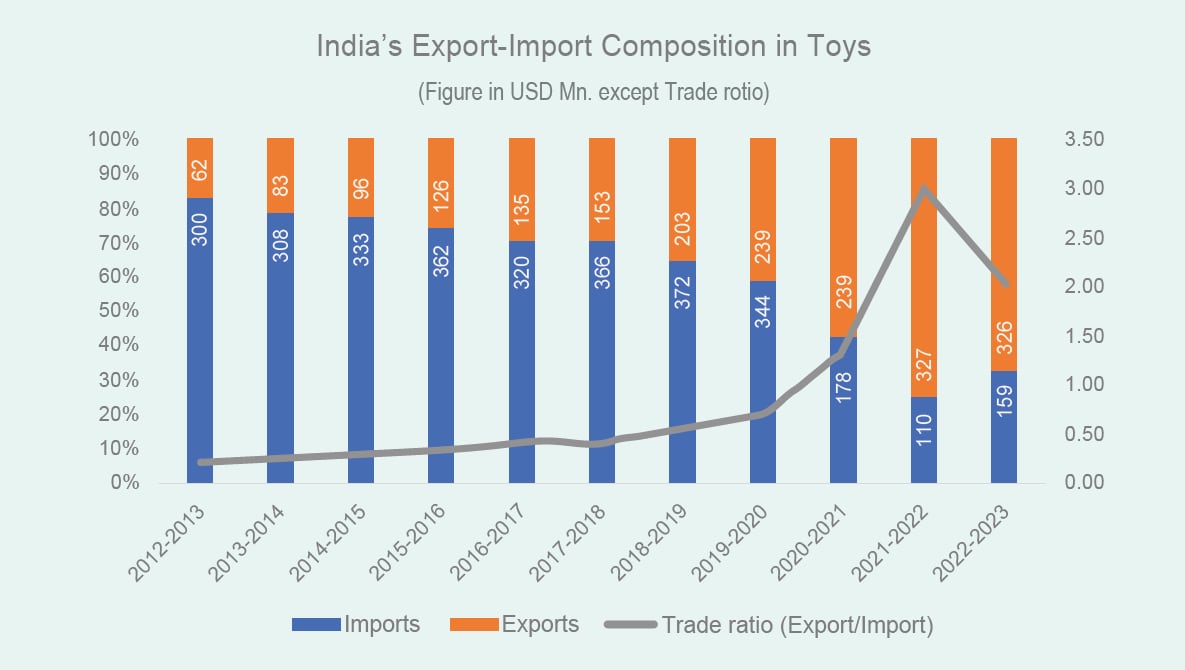
The Ministry of Commerce and Industry is presently not considering a new production-linked incentive scheme to boost domestic manufacturing of toys.
The ministry's focus is on ensuring that the existing PLIs in various sectors are well-implemented, according to Rajesh Kumar Singh, secretary of the Department for Promotion of Industry and Internal Trade.
"We are focused on getting these 14 PLIs up and running in a good way. So, for the time being, the new PLIs are not being considered and we will focus on ensuring that these existing schemes get implemented well and thereafter, we will see," he told mediapersons on Thursday.
Toys, footwear, and new-age bikes were among some of the sectors that were said to be in line for a possible PLI push, while being accommodated within the current outlay of Rs 1.97 lakh crore.
"Changes in tariff regime, combined with quality control, and support for the toy sector has had good results in terms of building global manufacturing capacity as well as exports," Singh said.
A report by the Indian Institute of Management, Lucknow, revealed that India's trade balance on toys stood at a deficit of $225 million in FY14, which turned to a surplus of $167 million by FY23.
Government interventions to this effect include increasing basic customs duty on import of toys from 20% to 70% in 2023, mandatory testing of all imported toys in 2019, quality control order on toys implemented from Jan. 1, 2021, exemption for micro units from setting up in-house testing facilities, issuing over 1,200 domestic and 30 foreign BIS licences and support of toy clusters.
There is no set timeline for reviewing the 70% custom duty on import of toys and it would depend on how the industry picks up, Singh told NDTV Profit on the sidelines of the event.
"We feel that these higher tariffs will continue for some more time and once the industry is able to be extremely cost-effective and efficient in terms of exports, then there could be a case for gradually phasing out or reducing it. But as of now, in the short and medium-term, it will continue," he said.

(Source: IIM Lucknow research)
Presently, the government's PLI scheme benefits 14 sectors—mobile manufacturing, drug intermediaries and API, medical devices, automobiles and auto components, pharmaceuticals drugs, specialty steel, telecom and networking products, electronic/technology products, white goods (ACs and LEDs), food products, textile products, solar PV modules, ACC batteries and drones.
The ministry will be conducting a third-party assessment of the PLI scheme in the white goods sector, Singh said.
It intends to analyse the scheme and its objectives from a holistic perspective, reach out to the beneficiaries to understand the benefits and the roadblocks, and assess from their report whether the scheme will need any course correction or tweaking, according to Joint Secretary Sanjiv Singh.
Essential Business Intelligence, Continuous LIVE TV, Sharp Market Insights, Practical Personal Finance Advice and Latest Stories — On NDTV Profit.























